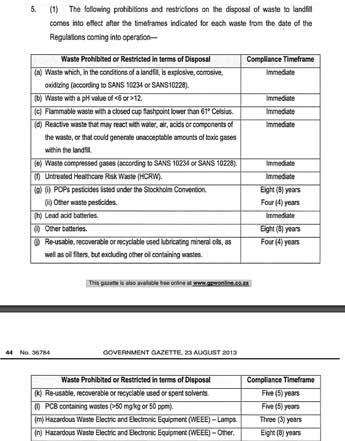
4 minute read
E-waste can no longer be ignored
from ReSource August 2020
by 3S Media
South Africa’s leading electrical and electronics producers are committed to growing the circular economy, but are consumers and landfills ready? Alastair Currie speaks to Keith Anderson, CEO, eWaste Association of South Africa, about the quest to implement effective diversion and recycling strategies.
What does South Africa’s current legislation say about e-waste disposal?
Advertisement
According to the Waste Classification & Management Regulations, Norms & Standards for Assessment and Disposal of Waste to Landfill , published in 2013, the disposal of waste electrical and electronic equipment (WEEE) to landfill will be prohibited from 2021. We are running out of time to get this promulgated and educate industry and consumers accordingly. Figure 1 is an extract from the above.
Are landfills complying?
This is a complex problem. Modern landfill sites are extremely expensive to construct and have sophisticated technology to monitor key aspects. However, if the prevailing laws that exist around landfill sites are not enforced, then we are creating a far bigger and more complex problem. When hazardous and toxic materials are dumped together, you are creating a deadly cocktail. Evidence would seem to indicate that poor enforcement and corruption are exacerbating the problems. The socioeconomic challenges on landfills are also problematic. In some instances, communities live on these sites and regard them as home. In addition, criminal elements are now also playing a role. The bottom line is that we need to do a better job.

Which e-waste products are classified as hazardous in SA?
National Waste Information Regulations, 2012, defines e-waste as hazardous waste (HW18) unless decontaminated with all hazardous substances removed (GW18).
What is the current status of South Africa’s Extended Producer Responsibility initiative?
In terms of the National Environmental Management: Waste Act (No. 59 of 2008), the Department of Environment, Fisheries and Forestry (DEFF) has started the consultation process on the proposed Extended Producer Responsibility (EPR) scheme for the electrical and electronic equipment sector. As an industry association, eWASA is engaging with the DEFF in terms of the new proposed EPR scheme. Once called for by the DEFF, we will submit a plan for an EPR scheme and, by default, all our members will form part of that plan. The EPR regulations, once implemented, will require all producers (anyone that manufacturers, assembles, distributes any electrical or electronic device) to register with an approved PRO (producer responsibility organisation), which is what eWASA is. The scheme will have to take specific recycling targets into account.
After an initial workshop in February 2020, where stakeholders could provide input into the framework on EPR, the DEFF developed and published regulations and notices in terms of Section 18 for public comment. The envisaged timeframe for EPR implementation is September 2020. All comments were due to the department by the end of July 2020.
A significant comment that we have brought to the table is the fact that Africa is a unique environment, meaning that EPR principles cannot simply be implemented on a European model. South Africa and other African countries face challenges such as unemployment, and a unique value chain where informal waste pickers work with the formal e-waste management industry to collect, dismantle, sort and recycle waste material. eWASA as an organisation strongly believes that it is time for real transformation in the waste sector, with more opportunities to create sustainable jobs and an integrated industry – from collectors to recycling companies and PRO management. Part of our envisioned plan is to provide South African Qualifications Authority-accredited training at the eWASA Academy covering entrepreneurship and waste management topics. It is our view that the South African solution can easily be adaptable in other African countries as part of their response to the circular economy.

FIGURE 1 An excerpt from the 2013 waste regulations
Would an advanced recycling fee work in South Africa?
We believe that it would. The benefit of such a scheme is that it is transparent for all to see – especially the consumer. OEMs would only be liable for their products. The key to this process is to ensure all ‘producers’ are registered and paying their portion of the said fee and that there are no free-riders. Furthermore, we would be able to track the fees paid and what they’ve been used for, ensuring that all e-waste is treated in a responsible manner. It must be a non-negotiable that these fees are managed by industry and not go into a black hole within National Treasury.
Is international donor funding available for local e-waste recycling initiatives?
There are some options available; however, investors, both locally and internationally, are wary of the current situation, given the stop-start and ever-changing scenario we’ve found ourselves in over the past few years in South Africa.
It requires a large capex investment to establish a proper e-waste recycling facility. Investors want the certainty of a proper legal framework, which sets out the obligations and rules of engagement. There must be a level playing field for all.
Where to from here?
If we do not get the go-ahead to proceed with the proposed EPR scheme, as mentioned, we face an uncertain future with many environmental challenges that are growing daily. Judging by the engagements we have been having with the DEFF, it appears that the minister is committed to bringing this longoutstanding matter to finality. Time will tell.


